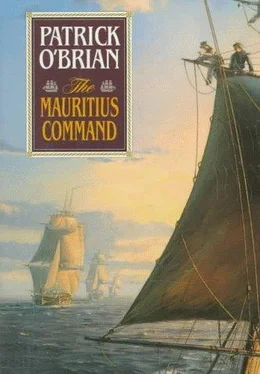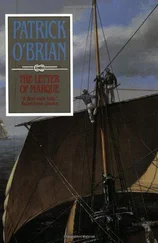Patrick O'Brian - The Mauritius Command
Здесь есть возможность читать онлайн «Patrick O'Brian - The Mauritius Command» весь текст электронной книги совершенно бесплатно (целиком полную версию без сокращений). В некоторых случаях можно слушать аудио, скачать через торрент в формате fb2 и присутствует краткое содержание. Жанр: Книги. Описание произведения, (предисловие) а так же отзывы посетителей доступны на портале библиотеки ЛибКат.
- Название:The Mauritius Command
- Автор:
- Жанр:
- Год:неизвестен
- ISBN:нет данных
- Рейтинг книги:5 / 5. Голосов: 1
-
Избранное:Добавить в избранное
- Отзывы:
-
Ваша оценка:
- 100
- 1
- 2
- 3
- 4
- 5
The Mauritius Command: краткое содержание, описание и аннотация
Предлагаем к чтению аннотацию, описание, краткое содержание или предисловие (зависит от того, что написал сам автор книги «The Mauritius Command»). Если вы не нашли необходимую информацию о книге — напишите в комментариях, мы постараемся отыскать её.
The Mauritius Command — читать онлайн бесплатно полную книгу (весь текст) целиком
Ниже представлен текст книги, разбитый по страницам. Система сохранения места последней прочитанной страницы, позволяет с удобством читать онлайн бесплатно книгу «The Mauritius Command», без необходимости каждый раз заново искать на чём Вы остановились. Поставьте закладку, и сможете в любой момент перейти на страницу, на которой закончили чтение.
Интервал:
Закладка:
"Many people start with ch, I believe. Have you told her about my stink-pot petrel?"
"Is not stink-pot a hellish low expression for a letter, Stephen?"
"Bless you, my dear, a mother that tends her own babies will not boggle at stink-pot. But you may put thalassodrome, if you find it more genteel."
The pen scratched on; the "cello sang deep; a midshipman tapped on the door. He reported a sail on the starboard quarter, adding that from a curious patch in her foretopsail she was thought to be the Emma.
"Aye, no doubt," said Jack. "She has made amazing good time. Thank you, Mr Penn." The Emma had been called in by aviso from her station off Rodriguez, but he had not looked for her sooner than Thursday. "Tom Pullings will be aboard presently," he said to Stephen. "We must keep him for dinner. After all this to and fro-ing off Rodriguez he will be glad of a bite of fresh mutton." He called out to Killick: the saddle of yesterday's sheep was to be ready at five bells precisely, together with half a dozen of the red Constantia and a drowned baby. They discussed Thomas Pullings, his indifferent prospects, his real deserts, his probable appetite; and the midshipman reappeared, breathless and staring: Staunch had just signalled four sail, bearing north-east.
"What says Emma?" asked Jack.
"I don't know, sir," said the midshipman.
"Then be so good as to find out," said the Commodore, with some asperity.
The Emma, it appeared, had nothing to say, No enemy in sight flew from her fore; no gun called for her pendant's attention; yet the Emma, with a seamanlike captain aboard, was nearer those four sail than the Staunch. The conclusion was obvious: the four sails were Indiamen . . . unless, he reflected, with a cold grip in his heart, they were English men-of-war.
Stepping thoughtfully out of the cabin, he took over the deck, hailed the Africaine that he was leaving the line, and hauled up to close the Emma. Hitherto the Boadicea had been proceeding under easy sail, at a pace suited to that of the transports, but now topgallants broke out, and with the fine breeze two points free she began to move like a thoroughbred. Her wake stretched white and long; her bow-wave rose to the bridle-ports and the spray came sweeping aft from her forecastle, making rainbows in the sun. Spirits rose high, and the boys and the younger topmen laughed aloud as they raced aloft to loose the royals: but a few sharp, unusually vehement orders from the quarterdeck did away with their more obvious mirth. The afterguard and the waisters moved as mute as mice, ludicrously tiptoeing when they could not be seen; those forward exchanged covert winks and nudges; and those high above murmured, "Watch out for squalls, mate" with a knowing grin. Little passes unnoticed in a man-of-war, and although only the Marine sentry and one or two members of the anchor-watch had seen Jack and Colonel Keating come aboard after Governor Farquhar's farewell dinner, the whole ship's company knew that the skipper "had taken a glass', that he had been "as pissed as old Noah', that he had been "brought down in a barrow, roaring for a woman for a black girl in his cot', and they smiled indulgently, whispering quotations from his homily on the beastly vice of inebriation, as he called out to know whether that tack was to be brought to the chesstrees this watch or not.
Now the Boadicea was really lying down to her work, shouldering the long swell aside with a fine living motion and making her ten knots with no effort, so that for all those untormented by vile premonitions it was a pleasure to feel her sail.
"This is what I had imagined life at sea to be like," said Mr Peter, a rare visitor to the quarterdeck--he spent most of his days in an airless paper lined hole beneath the waterline, dividing his time between seasickness and work. "Do you not find it exhilarating, sir?"
"Sure, it is like a glass of champagne," replied Stephen; and Mr Peter smiled, looking significantly at Colonel Keating, greyish-yellow and blinking in the sun. It was in fact the Colonel who had been brought down in a wheelbarrow; it was he who had so often cried "Let copulation thrive."
The Boadicea and the Emma were approaching at a combined rate of sixteen knots, and every few minutes pushed the eastward horizon back another mile. Soon the lookout told the deck of the four sail reported by the Staunch: then came another hail--two ships bearing eastnorth-east, and a hint of topgallantsails beyond them.
Six ships at least: it was almost impossible that so many should be Indiamen. Jack took a few turns, and his face grew more forbidding: he tossed off his coat, borrowed Seymour's telescope, and made his way up to the foretopgallant masthead. He was nearly there, with the shrouds creaking under his weight and the wind sweeping his long hair away to the north-west, when he heard the lookout mutter "Sixteen, seventeen . . . "tis a bleeding armada. An invincible bleeding armada. On deck, there . . . "
"Never mind, Lee," said Jack, "I can see "em myself. Shift over." He settled himself into the crosstrees and trained his glass east and north-east. There they lay, the greatest concentration of men-of-war he had ever seen in the Indian Ocean. And presently, to knock any lingering ghost of hope on the head, he made out the Illustrious, a two-decker wearing a vice-admiral's flag at the fore.
By this time the Emma was well within range. They had long since exchanged signals, and now the Emma was coming under the Boadicea� lee in her heavy wallowing fashion, while the frigate backed her foretopsail and lay to.
Jack took a last long look at the fleet, men-of-war and transports, and then lowered himself heavily down through the rigging, much as another man might have walked heavily down the stairs in his house, thinking not of the steps but of his own problems. He reached the deck and put on his coat as Pullings came up the side; and the contrast between the lieutenant's beaming face, white teeth flashing in the deep ruddy tan, and the Commodore's sombre look would have struck an eye far less observant than Stephen's. However, the mere force of Pullings's grin, his evident pleasure, brought an answering smile; and the smile grew a little more lively at the sight of a large bag hoisting up from the Emma's boat, the much-loved familiar mail-sack.
"There is no one so welcome as the postman, Mr Pullings," said Jack, inviting him into the cabin. "Whence come ye, Tom?" he asked, once they were there.
"Straight from the Admiral, sir," said Pullings, as though this were the best news that could ever be brought.
"From Mr Bertie?" asked Jack, whose protesting mind had faintly offered a hypothetical force bound for Java, perhaps, under a different vice-admiral, one with no responsibility for the Cape--an admiral who was merely passing by.
"That's right, sir," said Pullings cheerfully. "And he gave me this for you." He took a dog-eared Naval Chronicle from his pocket and plucked an official letter from among
its pages, marking the place with his thumb; but holding the letter aloft, not quite delivering it, he said, "So no post, sir, since I last saw you?"
"Not a word, Tom," said Jack. "Not a word since the Cape; and that was out of order. Not a word for the best part of a year."
"Then I am the first," cried Pullings with infinite satisfaction. "Let me wish you and Mrs Aubrey all the joy in the world." He grasped Jack's limp, wondering hand, wrung it numb, and showed the printed page, reading aloud, "At Ashgrove Cottage, Chilton Admiral, in Hants, the lady of Captain Aubrey, of the Boadicea, of a son and heir," following the words with his finger.
"Give it here," said Jack. He grasped the magazine, sloped the page to the light and pored over it intently.
"At Ashgrove Cottage, Chilton Admiral, in Hants, the lady of Captain Aubrey, of the Boadicea, of a son.
Читать дальшеИнтервал:
Закладка:
Похожие книги на «The Mauritius Command»
Представляем Вашему вниманию похожие книги на «The Mauritius Command» списком для выбора. Мы отобрали схожую по названию и смыслу литературу в надежде предоставить читателям больше вариантов отыскать новые, интересные, ещё непрочитанные произведения.
Обсуждение, отзывы о книге «The Mauritius Command» и просто собственные мнения читателей. Оставьте ваши комментарии, напишите, что Вы думаете о произведении, его смысле или главных героях. Укажите что конкретно понравилось, а что нет, и почему Вы так считаете.












